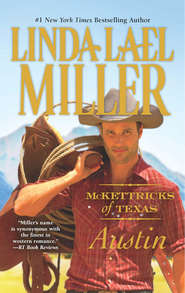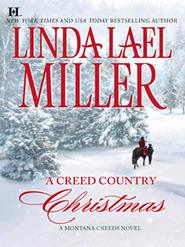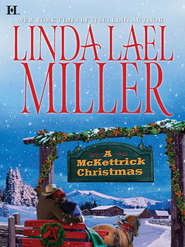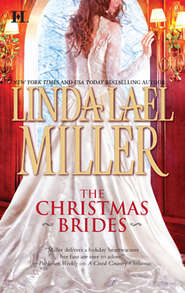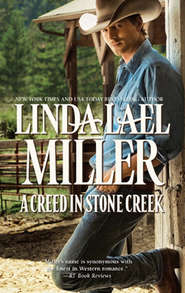По всем вопросам обращайтесь на: info@litportal.ru
(©) 2003-2024.
✖
The Mckettrick Way
Автор
Год написания книги
2018
Настройки чтения
Размер шрифта
Высота строк
Поля
Brad, meanwhile, turned his own chair around and sat astraddle it, with his arms resting across the back. He wore jeans, a white shirt open at the throat and boots, and if he hadn’t been so breathtakingly handsome, he’d have looked like any cowboy, in any number of scruffy little redneck bars scattered all over Arizona.
Meg eyed his drink, since doing that seemed slightly less dangerous than looking straight into his face, and when he chuckled, she felt her cheeks turn warm.
Pride made her meet his gaze. “What?” she asked, running damp palms along the thighs of her oldest pair of jeans. She’d made a point of not dressing up for the encounter—no perfume, and only a little mascara and lip gloss. War paint, Angus called it. Her favorite ghost had an opinion on everything, it seemed, but at least he’d honored his promise not to horn in on this interlude, or whatever it was, with Brad.
“Don’t believe everything you read,” Brad said easily, settling back in his chair. “Not about me, anyway.”
“Who says I’ve been reading about you?”
“Come on, Meg. You expected me to drink Jack Daniel’s straight from the bottle. That’s hype—part of the bad-boy image. My manager cooked it up.”
Meg huffed out a sigh. “You haven’t been to rehab?”
He grinned. “Nope. Never trashed a hotel room, spent a weekend in jail, or any of the rest of the stuff Phil wanted everybody to believe about me.”
“Really?”
“Really.” Brad pushed back his chair, returned to the jukebox, and dropped a few coins in the slot. An old Johnny Cash ballad poured softly into the otherwise silent bar.
Meg took a swig of her iced tea, in a vain effort to steady her nerves. She was no teetotaler, but when she drove, she didn’t drink. Ever. Right about then, though, she wished she’d hired a car and driver so she could get sloshed enough to forget that being alone with Brad O’Ballivan was like having her most sensitive nerves bared to a cold wind.
He started in her direction, then stopped in the middle of the floor, which was strewn with sawdust and peanut shells. Held out a hand to her.
Meg went to him, just the way she’d gone to the Dixie Dog Drive-In the day before. Automatically.
He drew her into his arms, holding her close but easy, and they danced without moving their feet.
As the song ended, Brad propped his chin on top of Meg’s head and sighed. “I’ve missed you,” he said.
Meg came to her senses.
Finally.
She pulled back far enough to look up into his face.
“Don’t go there,” she warned.
“We can’t just pretend the past didn’t happen, Meg,” he reasoned quietly.
“Yes, we can,” she argued. “Millions of people do it, every day. It’s called denial, and it has its place in the scheme of things.”
“Still a McKettrick,” Brad said, sorrow lurking behind the humor in his blue eyes. “If I said the moon was round, you’d call it square.”
She poked at his chest with an index finger. “Still an O’Ballivan,” she accused. “Thinking you’ve got to explain the shape of the moon, as if I couldn’t see it for myself.”
The jukebox in Jolene’s was an antique; it still played 45s, instead of CDs. Now a record flopped audibly onto the turntable, and the needle scratched its way into Willie Nelson’s version of “Georgia.”
Meg stiffened, wanting to pull away.
Brad’s arms, resting loosely around her waist, tightened slightly.
Over the years, the McKettricks and the O’Ballivans, owning the two biggest ranches in the area, had been friendly rivals. The families were equally proud and equally stubborn—they’d had to be, to survive the ups and downs of raising cattle for more than a century. Even when they were close, Meg and Brad had always identified strongly with their heritages.
Meg swallowed. “Why did you come back?” she asked, without intending to speak at all.
“To settle some things,” Brad answered. They were swaying to the music again, though the soles of their boots were still rooted to the floor. “And you’re at the top of my list, Meg McKettrick.”
“You’re at the top of mine, too,” Meg retorted. “But I don’t think we’re talking about the same kind of list.”
He laughed. God, how she’d missed that sound. How she’d missed the heat and substance of him, and the sun-dried laundry smell of his skin and hair…
Stop, she told herself. She was acting like some smitten fan or something.
“You bought me an engagement ring,” she blurted, without intending to do anything of the kind. “We were supposed to elope. And then you got on a bus and went to Nashville and married what’s-her-name!”
“I was stupid,” Brad said. “And scared.”
“No,” Meg replied, fighting back furious tears. “You were ambitious. And of course the bride’s father owned a recording company—”
Brad closed his eyes for a moment. A muscle bunched in his cheek. “Valerie,” he said miserably. “Her name was Valerie.”
“Do you really think I give a damn what her name was?”
“Yeah,” he answered. “I do.”
“Well, you’re wrong!”
“That must be why you look like you want to club me to the ground with the nearest blunt object.”
“I got over you like that!” Meg told him, snapping her fingers. But a tear slipped down her cheek, spoiling the whole effect.
Brad brushed it away gently with the side of one thumb. “Meg,” he said. “I’m so sorry.”
“Oh, that changes everything!” Meg scoffed. She tried to move away from him again, but he still wouldn’t let her go.
One corner of his mouth tilted up in a forlorn effort at a grin. “You’ll feel a lot better if you forgive me.” He curved the fingers of his right hand under her chin, lifted. “For old times’ sake?” he cajoled. “For the nights when we went skinny-dipping in the pond behind your house on the Triple M? For the nights we—”
“No,” Meg interrupted, fairly smothering as the memories wrapped themselves around her. “You don’t deserve to be forgiven.”
“You’re right,” Brad agreed. “I don’t. But that’s the thing about forgiveness. It’s all about grace, isn’t it? It’s supposed to be undeserved.”
“Great logic if you’re on the receiving end!”
“I had my reasons, Meg.”
“Yeah. You wanted bright lights and big money. Oh, and fast women.”
Brad’s jaw tightened, but his eyes were bleak. “I couldn’t have married you, Meg.”






